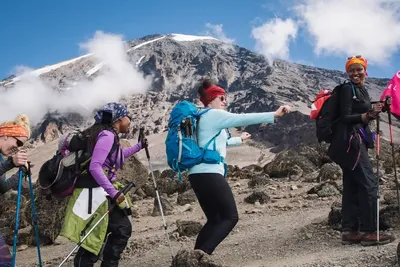Understanding Language Use on Mount Kilimanjaro Treks
Climbing Mount Kilimanjaro is an international experience, attracting trekkers from all over the world. As you ascend Africa’s highest mountain, communication with your guide and support team becomes essential—not just for information, but also for safety and connection. Fortunately, Kilimanjaro trekking staff are well-versed in multiple languages, especially English and Swahili. From your arrival at Kilimanjaro International Airport to the summit of Uhuru Peak, knowing what languages are commonly spoken will help you feel more prepared, confident, and culturally aware.

1. Main Languages Spoken on Kilimanjaro
During a Kilimanjaro climb, the most common languages you’ll encounter are:
- English – The primary language used by guides and most of the support team. It’s the standard for instructions, briefings, and safety communication.
- Swahili – The national language of Tanzania and commonly used among porters, cooks, and locals. You’ll often hear Swahili songs and phrases during your trek.
2. English: The Universal Climbing Language
English is widely spoken by professional mountain guides and used for all logistical details including route briefings, safety procedures, and client interaction. It’s the preferred language for international trekkers and required by most tour operators for clarity and safety.
Examples of English Use:
- Daily itinerary and briefing sessions
- Safety protocols and altitude awareness
- Camp instructions and mealtime communication
3. Swahili: Tanzania’s Heartbeat on the Mountain
Swahili adds a local flavor to your trek. It’s spoken among porters and guides, and you’ll hear it in camp songs, casual conversation, and friendly greetings. Learning a few Swahili words is a fun way to connect with the team and show cultural respect.
Common Swahili Words on Kilimanjaro:
- Jambo – Hello
- Asante – Thank you
- Pole pole – Slowly, slowly (a mantra on the mountain)
- Karibu – Welcome
- Twende – Let’s go
4. Other Languages Sometimes Spoken
Depending on your chosen trekking company, some guides may also speak:
- German
- French
- Spanish
- Italian
- Chinese or Japanese (rare but available with custom arrangements)
If you prefer a guide who speaks your native language, you can often request it in advance, though it may require additional arrangements and cost.
5. Singing and Team Spirit in Swahili
One of the most memorable parts of a Kilimanjaro trek is hearing your crew sing Swahili songs as motivation. Songs like “Kilimanjaro Hakuna Matata” or “Jambo Bwana” echo through the camps and trails, energizing climbers and creating a unique cultural experience. Singing is more than tradition—it’s a way to bond and uplift morale on the mountain.
6. How to Prepare
- Brush up on basic Swahili phrases before your trip.
- Communicate any language preferences with your operator early on.
- Use translation apps offline in case of language barriers (especially at lodges and local shops).
7. Final Thoughts
Language won’t be a barrier on Kilimanjaro if you speak English, but learning a few words of Swahili will add depth to your experience and help build rapport with your support crew. Guides are trained to ensure clear communication in challenging environments, and they’re often multilingual, serving clients from all over the globe.
Have specific language requests for your Kilimanjaro trek? Contact us at Chat on WhatsApp or jaynevytours@gmail.com and we’ll help you plan a climb that suits your needs.
